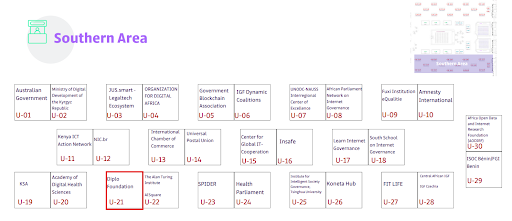Diplo will be actively engaged in the 2024 Internet Governance Forum (IGF 2024), which will take place between 15 and 19 December 2024 in Riyadh, Saudi Arabia, and online.
Diplo and the Geneva Internet Platform
Just-in-time reporting
As in previous years, the GIP Digital Watch observatory will provide just-in-time reporting from the IGF. Bookmark the Digital Watch space or download the Dig.Watch News+ app to stay up-to-date with our IGF session reports and newsletters. Make sure to also follow the GIP’s Twitter account.
Diplo and GIP sessions
Day 2 Event: Leveraging AI tools to explore IGF knowledge (organised by Diplo and GIP)
Tuesday, 17 December | 10:30 – 11:30 local time (07:30-08:30 UTC) | IGF Village stage
Since its launch in 2006, the IGF has been at the forefront of multistakeholder discussions on the most pressing issues surrounding the internet and digital technologies. Over the years, the forum has accumulated a wealth of knowledge covering critical topics such as access, digital divide, multilingualism, internet infrastructure, cybersecurity, privacy, data governance, and AI.
At the core of this IGF knowledge ecology are the forum’s annual meetings and the diverse contributions that individuals and organisations have brought to the many sessions held during these meetings.
In this session, Diplo will show how AI tools can be leveraged to tap into this rich and constantly refreshed knowledge built around the IGF.
Firstly, we will showcase our AI-supported reporting from the IGF 2024 meeting, which will include elements such as:
- AI-driven reporting from most IGF 2024 sessions.
- Visual mapping of discussions (knowledge graphs).
- An Ask IGF 2024 AI app.
Secondly, we will launch a pilot Ask IGF AI app built on transcripts from all previous IGF meetings. This app will enable users to:
- Identify how various digital governance topics have been discussed at the IGF;
- Connect and compare discussions across various IGF sessions, identify commonalities, link related topics.
Participating: Jovan Kurbalija, Sorina Teleanu
Identify how various digital governance topics have been discussed at the IGF;
Day 2 Event #78: Intelligent machines and society: An open-ended conversation (organised by Diplo and GIP)
Tuesday, 17 December | 16:30 – 17:30 local time (03:30-14:30 UTC) | Workshop Room 7, Theatre Format
Talks about AI have permeated the digital governance and policy space, from the principles and values with which we should steer AI development to which risks are the most urgent to mitigate. We talk a lot about challenges and opportunities and ways to ‘govern AI for humanity’; we tend to believe that new governance frameworks will be the solution we need to leverage AI for good, address the risks, and account for misuse and missed uses of the technology. But there are also broader, perhaps more philosophical questions about AI that we may want to spend a little more time on. We’d like to invite you to an open-ended conversation filled with questions. Through collective sense-making, we wish to ground the talk about risks and opportunities that AI brings in human experiences. In this out-of-the-box workshop, we promise not solutions but a set of critical questions that prompt us to clarify the former. The following questions are a primer: Epistemological challenges in knowledge creation: Large Language Models (LLMs) as our new coworker? Analysts? Assistant? What roles do we imagine LLMs play vis-a-vis humans? Missing the forest for the trees: Are there other forms of intelligent machines/agents beyond LLMs we tend to talk so much about? If so, how much are they reflected/considered in our AI policy and governance discussions? Assigning human attributes to AI: What do we talk about when we talk about AI ‘understanding’, ‘reasoning’, etc.? When words lose their meaning: Five years from now, will we all sound like ChatGPT? How will human-machine co-generated language evolve, now depending less on contexts but on tokens associated with probabilities?
This open-ended conversation is an attempt to encourage honest and humane reactions to the gradual integration of non-human agents in the society at large and discover the underlying values that humans commonly wish to protect or further reflect upon. Such an open sense-making exercise will help us get a firmer grasp on the society to come and potentially point to pathways that will lead to better outcomes/versions of this future society. Concretely, the unstructured yet thematised questions and responses coming from the audience will be transformed into a series of recommendations for further research to explore under-discussed areas of AI’s societal impacts, and proposals for more open-ended conversations to continue encouraging critical reflection and questioning spirits in eventual AI society. Event link on the IGF website.
Participating: Jovan Kurbalija, Sorina Teleanu
Diplo and CADE
Day 3 Event #266: Empowering civil society: Bridging gaps in policy influence (Co-organised by Diplo and partners in CADE)
Wednesday, 18 December | 15:30 – 16:30 local time (12:30 – 13:30 UTC) | Workshop Room 4
The engagement of Civil Society Organisations (CSOs) is vital for inclusive and accountable digital policy processes. CSOs not only represent diverse stakeholder interests, including those of marginalised communities, but also bring crucial insights that foster transparency and uphold fundamental rights within digital policy-making. However, despite their importance, CSOs encounter significant barriers such as restricted access to important policy discussions, challenges in navigating complex IG environments, and underrepresentation, especially from the Global South. During this workshop, we will present research findings from a key study conducted under the Civil Society Alliances for Digital Empowerment (CADE) project, funded by the European Union, on the capacity of CSOs to influence digital policy, with a focus on emerging technologies. Our discussion will focus on bridging the current gap between CSO engagement and their potential for profound influence in the IG arena. We will explore robust strategies for enhancing CSO influence in policy-making, and share actionable recommendations for governments and other stakeholders to better integrate CSOs into the IG process. Participants will also engage with innovative approaches and best practices that have demonstrated concrete impacts in strengthening the role of civil society in shaping effective digital governance frameworks. This workshop not only provides CSOs with the tools and insights needed for greater advocacy efficacy but also fosters a collaborative dialogue among all stakeholders, striving for a governance model that truly reflects the needs and rights of all internet users. Event link on the IGF website.
Participating: Stephanie Borg Psaila
Diplo and the Geneva Dialogue on Responsible Behaviour in Cyberspace
Day 3 Event #190 Securing critical infrastructure in cyber: Who and how? (co-organised by Diplo and partners in the Geneva Dialogue)
Wednesday, 18 December | 13:45 – 15:15 local time (10:45 – 12:15 UTC) | Workshop Room 4
In the times when increasing interdependencies span across national borders and, along with hybrid conflicts, in which the line between cyber and physical becomes blurrier and, probably, less relevant, are states and relevant stakeholders sufficiently equipped to protect the most critical assets? How do the relationships between public and various private actors, both during conflict and peace times, transform in protecting critical infrastructure? How do the existing and emerging tech impact critical infrastructure protection (CIP)? Is there a need for an international approach to, and minimum cybersecurity measures for CIP, and what would those include? What role do the agreed UN framework and cyber norms play in CIP? Are the roles and responsibilities clear for non-state stakeholders, and how can they support states in promoting responsible behaviour in cyberspace? The Geneva Dialogue on Responsible Behaviour in Cyberspace (GD) addresses these concerns in a multistakeholder approach, engaging representatives from the private sector, academia, civil society, and technical community for a regular dialogue. Established by Switzerland in 2018 and implemented by DiploFoundation with support of others, the GD maps the roles and responsibilities of various actors in the implementation of agreed cyber norms and thus contributes to stability and security in cyberspace. The outcomes of those dialogues are published in the Geneva Manual, offering a comprehensive guidance on non-state actors’ implementation of the normative framework agreed by states, in the context of the UN GGE/OEWG. The session will bring together actors, including those from the Global South, to discuss the issues identified above, provided also in a format of a scenario-based discussion, i.e. simulation exercise with the cards developed by the GD. The insights gathered during the session will contribute to the forthcoming chapter of the Geneva Manual, focusing on the implementation of CIP related norms and confidence-building measures (CBMs). Event link on the IGF website.
Participating: Anastasiya Kazakova | Vladimir Radunović
Sessions with Diplo involvement
Day 1 Parliamentary Session 1: Digital cooperation at the United Nations: A briefing for parliamentarians
Monday, 16 December | 15:00 – 15:45 local time (12:00-12:45 UTC)
Participating: Sorina Teleanu
Day 2 Event: Policy network on artificial intelligence
Tuesday, 17 December | 15:15 – 16:30 local time (12:15-13:15 UTC)
Participating: Sorina Teleanu
Diplo/GIP booth in the IGF village
If you’re joining the meeting online, check out our space in the virtual village.
If you are attending the IGF in Riyadh, make sure to drop by our Diplo and GIP booth, numbered U-21.



